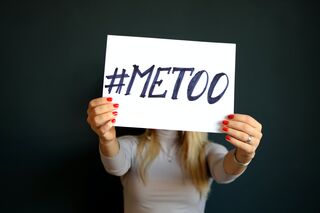Suicide
Does Sexual Harassment Raise the Risk of Suicide?
New research shows the outcomes when sexual boundaries are violated.
Posted November 1, 2020 Reviewed by Abigail Fagan

The #MeToo movement has generated a lot of interest in sexual harassment in recent years and its impact on employees, businesses and society. A body of research has linked sexual harassment in the workplace to mental health factors such as psychological distress, anxiety and depression and physical health issues such as illnesses and absenteeism due to poor health. Yet, researchers have not paid much attention to the relationship between workplace sexual harassment and suicide attempts.
A new study published by The BMJ found that workers who have been exposed to sexual harassment—"undesirable advances or offensive references to what is generally associated with sexual relations" in their workplace—are at greater risk of suicide and attempting suicide. A team of Swedish researchers decided no workplace can be considered safe unless it’s free of harassment and that this issue couldn’t be sidelined any longer. They set out to determine how exposure to workplace sexual harassment is tied to suicidal behavior in a large population of Swedish workers. The study was based on a Swedish Work Environment Survey database of 85,205 men and women of working age who completed a questionnaire about work-related sexual harassment between 1995 and 2013.
The investigators asked employees if they had been sexually harassed in their workplace in the past 12 months--including anyone from management, co-workers, patients, clients and students. Incidences of suicides or suicide attempts over a follow-up period of 13 years were identified from administrative registers. A total of 4.8% of the workers reported workplace sexual harassment during the previous 12 months: 1.9% of the men and 7.5% of the women. Those exposed were more likely to be younger, single, divorced and in low paid but high strain jobs.
Altogether 816 people attempted suicide and 125 people completed suicide during the follow-up period. Workplace sexual harassment was found to be associated with a 2.82 times greater risk of suicide and 1.59 times greater risk of attempted suicide. There were no significant differences in rates between the sexes. The research team reported that sexual harassment from others was more strongly linked with suicide than sexual harassment from superiors or fellow workers. Still, the authors of the study say that workplace interventions focusing on the social work environment and behaviors could contribute to a decreased rate of suicide.
No one would disagree that the workplace must be a safe place for everyone. American researchers believe this study underscores the need to consider workplace sexual harassment as both an occupational hazard and a significant public health problem. They contend that new ways to prevent and address workplace sexual harassment are urgently needed. They also insist that victims of sexual harassment should receive mental health screening and treatment to mitigate risks for subsequent mental health concerns and suicide leanings.
Reach Out For Help
A 2018 CareerBuilder survey found that the majority of victims of sexual harassment continue to keep quiet. Of those who have been sexually harassed, 72% didn’t report the incident, and 54% didn’t confront the person responsible for the harassment. Workplace sexual harassment affects a victim's mental health and emotional well-being. It needs to be addressed in a sensitive, empathetic, and more emotionally aware manner.
If you are struggling with workplace sexual harassment (virtually or face-to-face), speak directly with the other person involved or bring the incident to the attention of your human resources officer or manager. If neither of these steps is feasible, there are a variety of external resources that offer legal and mental health support:
National Suicide Prevention Lifeline provides 24/7 free and confidential support for people in distress. 800-273-8255.
Just answer.legal provides help with workplace harassment claims.
NavexGlobal offers sexual harassment training courses to organizations to educate their employees.
OperationsInc serves as an unbiased, third-party subject matter expert where employees can report incidents of sexual harassment.
Find a therapist through the Psychology Today Therapy Directory.
References
Hanson, L. M., et al. (2020). Work related sexual harassment and risk of suicide attempts: prospective cohort study. BMJ. DOI.org/10.1136/bmj.m2984
BMJ. (2020, September 2). Exposure to workplace sexual harassment linked to an increased risk of suicidal behavior: Measures targeting inappropriate behaviors in the social work environment could help reduce suicide, say researchers. ScienceDaily. Retrieved from www.sciencedaily.com/releases/2020/09/200902185524.htm


